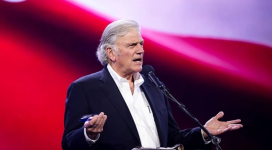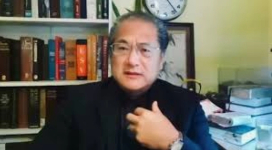PLANO, Texas – Conservative Episcopal leaders representing a tenth of the denomination will meet today in Plano Texas in the closed door, tight-lipped, two-day conference over the future of their network and the U.S. branch of the World Wide Anglican communion.
Bishop Robert Duncan of Pittsburgh, the temporary leader to the “Network of Anglican Communion Diocese and Parishes,” said the meeting would give traditionalists “some sense there is a future.”
The network was formed following the consecration of a gay man as bishop to New Hampshire on Nov. 2. Currently bishops, clergy and lay delegates from 12 dioceses are part of the network. Many foreign Anglican churches have denounced or broken fellowship with the Episcopal Church – the U.S. Branch of their communion, over the consecration.
Delegates to the pivotal conference – the largest gathering of conservative Episcopalians to date - will adopt an organizational charter, elect leaders and debate how to help conservative parishes in liberal dioceses. Planners insist the network isn't a breakaway denomination or schism, but a "church within a church." Most details, including who wrote the charter draft and what it proposes remain confidential.
Since its inception, the network asserted it does not want to officially leave the church, mostly because of the property laws that bind them to the national denomination. The Rev. Donald Armstrong, a delegate representing Midwestern and Mountain states, says of his Colorado Springs, Colo., parish, "We've got a $12 million facility and we can't just walk away from it."
However, a leaked memo from a network leader showed that the network’s “ultimate goal” was a “replacement” jurisdiction aligned with the conservative majority in world Anglicanism. It also mentioned that such disobedience of church law "may be necessary" and conservatives should be prepared to risk trials in church or secular courts.
Bishop James Stanton of Dallas, who will host the conference, said that calling the network schismatic "gets things exactly backwards" because "the act of schism" was the national denomination's approval for Robinson.
Canon David Anderson, president of the American Anglican Council that is helping the network, said the charges against the conservative movement were unleashed to “derail” the Plano meeting. On the comment made Sunday, Anderson said the Episcopal Church's actions created the need for a new structure "through which orthodox Episcopalians can remain in full fellowship with Anglicans worldwide," and any "replacement" is up to overseas Anglican leaders who suggested the idea.
Instead, Bishop Stanton said the network wants a positive tone so as to gather further support among the 43 of 105 Episcopal bishops who voted against November’s consecration. Parishes in 37 dioceses have applied to the network to provide visiting bishops.







